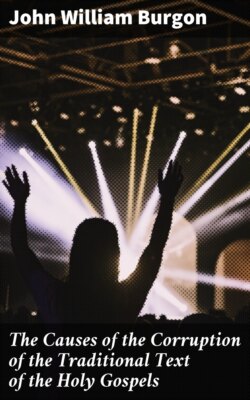Читать книгу The Causes of the Corruption of the Traditional Text of the Holy Gospels - John William Burgon - Страница 30
На сайте Литреса книга снята с продажи.
§ 2.
ОглавлениеTable of Contents
Sometimes this affects the translation. Thus, the Revisers propose in the parable of the prodigal son—'And I perish here with hunger!' But why 'here?' Because I answer, whereas in the earliest copies of St. Luke the words stood thus—ΕΓΩΔΕΛΙΜΩΑΠΟΛΛΥΜΑΙ, some careless scribe after writing ΕΓΩΔΕ, reduplicated the three last letters (ΩΔΕ): he mistook them for an independent word. Accordingly in the Codex Bezae, in R and U and about ten cursives, we encounter εγω δε ωδε. The inventive faculty having thus done its work it remained to superadd 'transposition,' as was done by [Symbol: Aleph]BL. From εγω δε ωδε λιμω, the sentence has now developed into εγω δε λιμω ωδε: which approves itself to Griesbach and Schultz, to Lachmann and Tischendorf and Tregelles, to Alfoid and Westcott and Hort, and to the Revisers. A very ancient blunder, certainly, εγω δε ωδε is: for it is found in the Latin[67] and the Syriac translations. It must therefore date from the second century. But it is a blunder notwithstanding: a blunder against which 16 uncials and the whole body of the cursives bear emphatic witness[68]. Having detected its origin, we have next to trace its progress.
The inventors of ωδε or other scribes quickly saw that this word requires a correlative in the earlier part of the sentence. Accordingly, the same primitive authorities which advocate 'here,' are observed also to advocate, above, 'in my Father's house.' No extant Greek copy is known to contain the bracketed words in the sentence [εν τω οικω] του πατρος μου: but such copies must have existed in the second century. The Peshitto, the Cureton and Lewis recognize the three words in question; as well as copies of the Latin with which Jerome[69], Augustine[70] and Cassian[71] were acquainted. The phrase 'in domo patris mei' has accordingly established itself in the Vulgate. But surely we of the Church of England who have been hitherto spared this second blunder, may reasonably (at the end of 1700 years) refuse to take the first downward step. Our Lord intended no contrast whatever between two localities—but between two parties. The comfortable estate of the hired servants He set against the abject misery of the Son: not the house wherein the servants dwelt, and the spot where the poor prodigal was standing when he came to a better mind.—These are many words; but I know not how to be briefer. And—what is worthy of discussion, if not the utterances of 'the Word made flesh?'
If hesitation to accept the foregoing verdict lingers in any quarter, it ought to be dispelled by a glance at the context in [Symbol: Aleph]BL. What else but the instinct of a trained understanding is it to survey the neighbourhood of a place like the present? Accordingly, we discover that in ver. 16, for γεμισαι την κοιλιαν αυτου απο, [Symbol: Aleph]BDLR present us with χορτασθηναι εκ: and in ver. 22, the prodigal, on very nearly the same authority ([Symbol: Aleph]BDUX), is made to say to his father—Ποιησον με 'ως 'ενα των μισθιων σου:
Which certainly he did not say[72]. Moreover, [Symbol: Aleph]BLX and the Old Latin are for thrusting in ταχυ (D ταχεως) after εξενεγκατε. Are not these one and all confessedly fabricated readings? the infelicitous attempts of some well-meaning critic to improve upon the inspired original?
From the fact that three words in St. John v. 44 were in the oldest MSS. written thus—ΜΟΝΟΥΘΥΟΥ (i.e. μονου Θεου ου), the middle word (θεου) got omitted from some very early copies; whereby the sentence is made to run thus in English—'And seek not the honour which cometh from the only One.' It is so that Origen[73], Eusebius[74], Didymus[75], besides the two best copies of the Old Latin, exhibit the place. As to Greek MSS., the error survives only in B at the present day, the preserver of an Alexandrian error.
